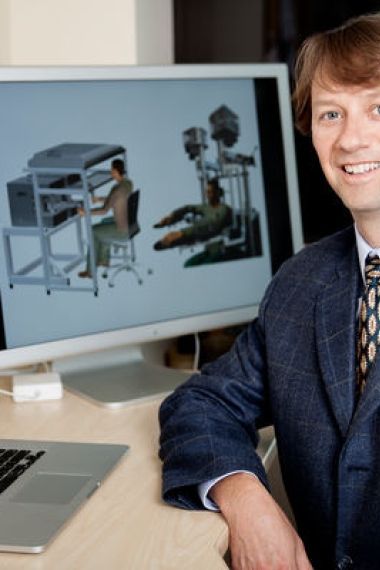
Stephen Scott
- Professor, Department of Biomedical and Molecular Sciences, member, Centre for Neuroscience Studies and the CIHR Group in Sensory-Motor Systems, and Director, Laboratory of Integrative Motor Behaviour (LIMB Lab), Queen’s University
- GlaxoSmithKline (GSK) Chair in Neurosciences, Faculty of Health Sciences, Queen's University
Advanced technologies for neurological assessment, robotics, motor control, stroke
Dr. Stephen Scott is a professor in the Department of Biomedical and Molecular Sciences at Queen's University. He is also a member of the Centre for Neuroscience Studies and the CIHR Group in Sensory-Motor Systems. He graduated from the University of Waterloo in Systems Designs Engineering for his undergraduate degree and an MASc with Dr. D.A. Winter. He then completed his PhD with Dr. Gerald Loeb at Queen’s University in the Department of Physiology, followed by postdoctoral training at the Université de Montréal, Department of Physiology, with Dr. John Kalaska. His first faculty position was as a chercheur adjoint in the Department of Physiology at Université de Montréal in 1995. He moved his lab to Queen's University in 1997.
- PhD (Queen’s University)
- BASc, MASc (University of Waterloo)
Spanning the specializations of systems neuroscience, cognitive/behavioural neuroscience and clinical neuroscience, Dr. Scott’s research focuses on how different regions of the brain are involved in motor control and learning. He is the inventor of a robotic device called KINARM, the world's first robotic system for measuring, with exquisite sensitivity and precision, the effects of brain injury on an individual's ability to perform ordinary movements and tasks.
In addition to being used in 60 institutions worldwide for research into a wide range of brain injuries and diseases, such as stroke, concussion, transient ischemic attack, traumatic brain injury, and Parkinson’s disease, KINARMs are currently being used in more than 10 clinical studies at Kingston General, Hotel Dieu, and St. Mary’s of the Lake hospitals, investigating topics as diverse as sensorimotor function in children, ALS, the impact of cardiac arrest or kidney failure on brain function, and motor performance before and after shoulder joint replacements.
